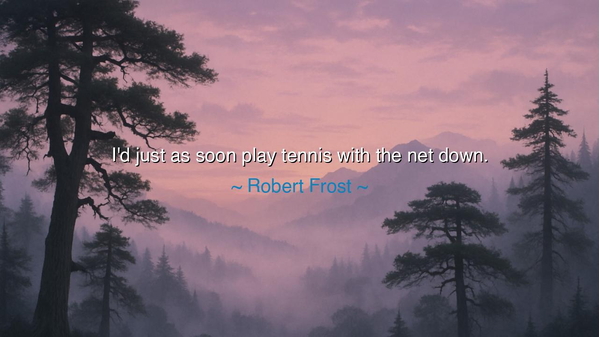
I'd just as soon play tennis with the net down.






When Robert Frost, the poet of stone walls and snowy woods, remarked, “I’d just as soon play tennis with the net down,” he was not speaking of sport but of art, of discipline, of the boundaries that give meaning to creation. His words, at once humorous and profound, were directed against those who would seek poetry without form, freedom without structure, and expression without rule. To Frost, writing verse without meter, rhyme, or shape was as senseless as playing tennis without the net: the essence of the game, the very challenge that gives it beauty, is lost.
The origin of this saying comes from Frost’s defense of traditional poetic forms during a time when free verse was rising in popularity. While modernist poets sought liberation from rhythm and rhyme, Frost saw structure not as a prison, but as a framework for greatness. Just as the net in tennis defines the boundaries and forces the player to rise to the challenge, so too do the forms of poetry sharpen the mind, discipline the tongue, and demand true artistry. To remove them, in his view, was to rob poetry of its test and thus of its triumph.
The ancients understood this lesson well. The tragedians of Greece, Aeschylus and Sophocles, did not despise the strict forms of their theater—they embraced them, weaving masterpieces within the rigid patterns of chorus and meter. The sculptors of marble did not complain that the stone limited them; they rejoiced that from such limitations emerged the highest beauty. Structure is not the enemy of art, but its ally. Frost’s metaphor of tennis with the net down is therefore eternal: greatness is not found in removing difficulty, but in mastering it.
Consider the story of Michelangelo, who looked upon a block of marble and saw within it the figure of David. The stone resisted him, the chisel demanded patience, and the form was constrained by the nature of the rock. Yet from within that resistance emerged a masterpiece. Had Michelangelo been given clay without limit, the work would not have endured in majesty. The net, whether of stone or verse, compels the artist to rise higher, to struggle nobly, to create with force and intention.
The lesson here is profound: in life, as in poetry, boundaries are not prisons but guides. The obstacles we face, the rules we obey, the disciplines we endure—these are the nets across which we must strike. Without them, there is no game, no art, no victory. To long for life without limits is to long for emptiness; but to embrace limits as challenges is to discover greatness. Freedom without form is chaos, but freedom through form is creation.
What then must we do? First, we must honor the structures that test us—be they the rules of our craft, the duties of our calling, or the hardships of our journey. Second, we must resist the temptation to remove all difficulty, for the net exists not to hinder but to make the game worth playing. Third, we must see in discipline not oppression, but opportunity—the chance to shape something enduring and beautiful.
Thus, Robert Frost’s words endure as both jest and judgment: “I’d just as soon play tennis with the net down.” They call us to embrace the nets of our lives, the boundaries that give meaning to our struggle, and to recognize that only in striving against resistance do we achieve the glory of true creation. Let us therefore step onto the court of existence with courage, knowing that the net is not our enemy but our proving ground. For beyond the net lies victory, and beyond discipline, greatness.






AAdministratorAdministrator
Welcome, honored guests. Please leave a comment, we will respond soon